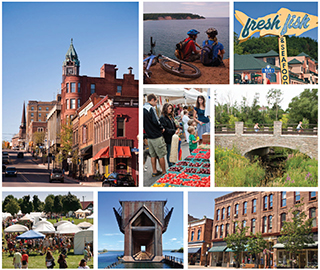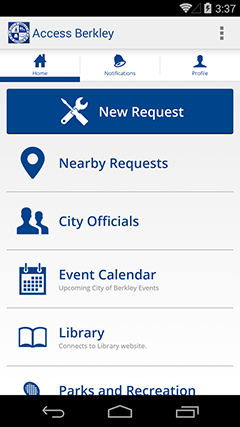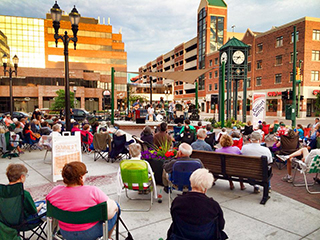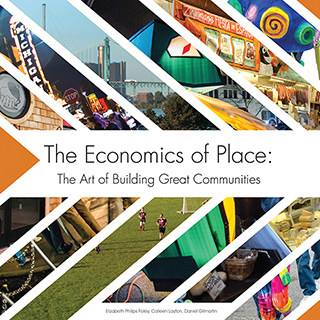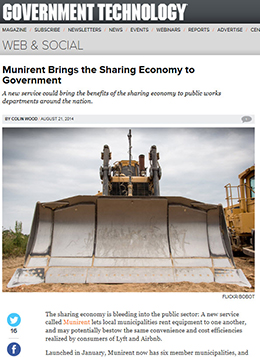League Member Communities Attending Convention in Marquette Share Placemaking Success Stories
By: smurugesan,
October 15, 2014
Each year, the Michigan Municipal League Board president gives a welcome speech to kick-off our Convention. League President Jacqueline Noonan, Utica mayor, put her own unique spin on this year’s talk that took place Wednesday afternoon (Oct. 15, 2014) at our Convention in Marquette.
Instead of just talking about things happening with the League, Noonan told about some of the positive placemaking work being done in League member communities. To assist her, we put out a call for examples and our members responded in droves.
We got so many responses that we couldn’t begin to fit them all in her speech. Instead, we decided to put them in this blog. Here are some projects shared with us:
Auburn Hills – Four new developments have opened in the city’s downtown in the past year, including The DEN (Downtown Education Nook) built from the log cabin, a historic landmark in downtown Auburn Hills; the University Center; Auburn Square apartments and retail building; and a new 233-space parking structure.
Battle Creek – The city will be drying its “poop”! Yup, you heard right. Nearly all communities deal with the challenge of solid waste disposal, but you’d be hard-pressed to find one doing what Battle Creek is doing. They are the first municipality in the country to try the PulverDryer process. Plus, the community wrapped up its downtown infrastructure transformation a couple of years ago and construction is now underway on the city’s new farmers market/festival area with a planned completion date of May, 2015.
Berkley – This past spring, the City of Berkley was among the first Michigan communities to launch a free mobile app for its residents. “Access Berkley” enables residents to interact with the city, request and track work orders, easily find information, and more. The community also has partnered with the Michigan Municipal League to complete a placemaking study for a signature area in its blossoming downtown.
Bessemer – The City of Bessemer recently completed its downtown Ethnic Commons Park depicting the community’s cultural heritage. The project was made possible through a state grant and strong local support.
Blissfield – The community recently opened its new Village Office and Police Station. This is a project long in the making, and it is smack in the middle of downtown, revitalizing a former bank building.
Bronson – The city was able to take advantage of MDOT’s technical assistance program to receive a walkability review of the community. Since that time, the city has acquired a former rail line and plans to create a nearly mile-long walking and recreational path/parkway.
Clare – Cops and Doughnuts located in downtown Clare is a past winner of the League’s Community Excellence Award. The business has experienced tremendous growth in recent years and is helping inspire a revitalization of the entire downtown. The business has experienced record sales this year, bringing in more than 250,000 visitors to the city. The downtown now has zero vacant store fronts, including a recent announcement of the first tenant going into a previously vacant professional building downtown. Other new businesses in town include a new retail shop, restaurant and pub serving only Michigan brews and wines, a coin shop, music store, coffee shop, barber shop, and by December the city’s first brew pub (Four Leaf Brewing). The city also has acquired and moved a historic railroad depot into downtown to house the chamber and visitors’ bureau, arts council, museum and to serve as the trail head for Pere Marquette Rail-Trail.
Davison – The city recently completed its M-15 Recreational Heritage Route bike trail.
East Lansing – The city recently completed a two-year project to redevelop Ann Street Plaza in its core downtown, including a complete redesign and reconstruction of the plaza to remove vehicle parking, and add benches, landscaping, outdoor fireplace and a performance stage. The project was driven by the adjacent redevelopment of two properties into eight-story and five-story mixed use buildings with upscale apartments and first floor restaurants with outdoor seating overlooking the new plaza. Total investment in the two projects and plaza exceeded $13 million.
Elk Rapids – After purchasing a foreclosed riverfront vacant industrial building, the Village of Elk Rapids cleared the property, opening up a beautiful bay and harbor view from US-31. The new green space has hosted summer folk concerts; a Bourbon, Beer and Bluegrass Festival; and has added more than 20 new boat slips to the upper harbor of Elk Rapids’ award winning harbor enterprise.
Flint – The city created a new health and wellness district downtown in buildings once owned and occupied by The Flint Journal. The city’s farmers market relocated into the former Flint Journal press building and Michigan State University’s College of Human Medicine public health program is moving into the Journal’s former office building. The total investment in new buildings, infrastructure and programs is over $80 million and more than 150 new jobs will be on site. The farmers market alone supports over 100 small businesses and is seeing up to 10,000 customers on summer Saturdays.
Fraser – The city is currently finishing the first phase of a boundless park, designed for all children regardless of physical or mental challenges. They received a $300,000 grant from MDNR and expect to finish the first phase – the infrastructure improvements, ADA restrooms and a pavilion – before winter hits. They also just completed a joint bid with the City of Roseville for a new radio read meter system, called Automated Meter Infrastructure. This joint project and bid resulted in estimated savings of more than $300,000 to both communities.
Grand Haven – The city received an MEDC Downtown Infrastructure Grant to connect a major state highway to its downtown and waterfront. The project involved reconstructing two city blocks to create an attractive entryway to the downtown area from the very busy north/south corridor. Interest in private investment is spiking and the city can hardly keep up with new site plans and building inspections.
Grand Rapids – The City of Grand Rapids, Downtown Grand Rapids Inc. and the Michigan Economic Development Corporation partnered with Lofts on Monroe, LLC to support a $2 million private investment in a placemaking project to remodel the historic downtown building for a mixed-use retail, office and residential project located adjacent to the city-owned Memorial Park.
Hastings – After years of effort, the community finally got a hotel that can now be used to attract visitors and host large and small events, such as conferences, weddings and family reunions. The project involved multiple parties and agreements and culminated with the opening of a Holiday Inn Express last winter. The much-needed and sought-after hotel would not have been built if it were not for the gap financing provided by the Barry Community Foundation, through a Program Related Investment (PRI) Revolving Loan Fund (established by local philanthropists) and the Progressive  Intergovernmental Agreements between Rutland Township and the City Hastings to provide Urban Level Services to the site.
Howell – The city recently saw the completion of the Heart of Howell (www.heartofhowell.com) project that rehabilitated three historic buildings downtown. The project involved taking three adjacent historic buildings, formally known as the Swanns, Thistledown, and Spag’s buildings, and turning them into a beautiful multi-use complex.
Ironwood – The League’s 2014 Community Excellence Award Winner is experiencing a tremendous resurgence in its downtown, including a new Italian restaurant, a photo studio, a high-end resale clothing store and possibly a micro-brewery. These are all spinoff businesses resulting from the energy and vibrancy generated from a Downtown Blueprint plan created about five years ago. The Downtown Blueprint, was developed in partnership with the city, DDA, and Michigan State Housing Development Authority and led to the establishment of a new art center area downtown.
Mason – The city recently completed construction of a multi-purpose stage in Rayner Park. This stage was constructed to highlight concerts, community theatre, and the Orchestral Society, and has the ability to have movies projected onto the doors. This $50,000 project was completed with volunteer labor, donated funds, and not one dollar of taxpayer money. Also, after five years of posturing, negotiating, and coordinating, restoration work has started on the oldest building in downtown Mason.
Milan – The city has experienced great success working with other local governments to create win-win programs, such as a joint fueling agreement, a sewer treatment agreement and an effort called “MuniRent,” which allows participating entities to quickly and easily rent equipment from nearby municipalities. The city is also on the verge of a downtown redevelopment which has been four years in the making. In addition, the city and community organizations are embarking on a crowdfunding effort to build a pavilion and make other improvements to a centralized park.
Negaunee – The city just completed a $4.3 million dollar wastewater project that allowed three communities to share in the operation of one wastewater treatment facility. More importantly, during the construction of this multi-year project, the City of Ishpeming was able to complete four other projects (with better than anticipated outcomes) due to the enthusiastic cooperation of engineers, MDEQ, contractors, city staff and councils.
Plymouth – The city hosts over 180 events annually as part of its efforts to create a sense of place. Events range from Plymouth’s largest event – Art in the Park, to Yoga in the Park, parades, five different running races, and the annual Rotary Chicken Dinner, serving 11,000 dinners on a Sunday afternoon. All of the events are managed privately and pay the city’s expenses for services provided during the events.
Port Huron – The city boasts several projects resulting from creative partnerships that aim to enhance the downtown area and improve public access to the community’s waterfronts. These projects, including the Blue Water River Walk, Downtown Kayak Launch, and Downtown Lofts, have provided increased recreational opportunities, residential amenities and unique gathering spots for all age groups.
Sault Ste. Marie – The city signed a memorandum of understanding with its sister-city, Sault Ste. Marie, Ontario, Canada that calls for closer collaboration between the two entities in fostering international economic growth and prosperity initiatives.
Sterling Heights – The city saw the construction of a new state-of-the-art Chrysler 200 assembly facility valued at over $1 billion. It was one of the largest construction projects in southeastern Michigan over the past year and over 1,000 new employees have been added. The plant was destined for closure in bankruptcy, but through a collaborative effort, in which the League was involved, it was saved and is now thriving. It is the only example in the country of a facility being bought out of bankruptcy and reopened. This is a great example of collaboration. And as city manager Mark Vanderpool says, “It is hard to implement placemaking without economic vitality. They go hand in hand.” Sterling Heights also completed a kayak/canoe landing on the Clinton River. The city has seven miles of bike/hike trails and most of the system is along the Clinton River.
Utica – The city and Macomb County over the summer announced plans to construct a 2,500-seat minor league baseball park that will be home to a newly formed local baseball league as early as next year. Utica Mayor Noonan called the project a “game-changer” for the tiny, 197-year-old city, with Utica attracting families, shoppers and more tax dollars, while parcels that have remained empty for many years will be put to use.
The Michigan’s Municipal League’s new book, The Economics of Place: The Art of Building Great Communities, is being officially unveiled at this week’s Convention in Marquette. (View photos from our Convention here.) The book is full of dozens of more placemaking stories. Learn more at economicsofplace.com and you can order the book by clicking here.
Matt Bach is the League’s director of media relations. He can be reached at [email protected] and (734) 669-6317.
